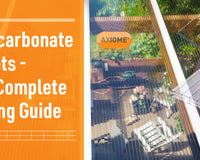When selling a house, certain features tend to attract the most buyers by enhancing the property’s appeal and potential for a quick sale. Whether it’s interior features like smart home tech, environmental things like the local area, or exterior features like the garden and guttering, these features vary somewhat by location and market trends, but some key elements consistently draw interest.
We’ve surveyed people around the UK to determine which features they find most attractive when buying a new property. You might be surprised by the results!
House features that attract the most buyers

1. Location | 51.2%
The location of the property is the main selling point for potential buyers. Over half of the people surveyed said this was the most crucial factor when choosing their next home. This factor was over 30 times higher than one of the lesser chosen features, access to local schools (1.7%).
The location was most important to people between 55 and 64, where 62.8% answered that they had this at the top of their priorities.
2. Price | 19.1%
According to our research, property price is home buyers' second most important feature. Over 19% of respondents rated the cost of the house as the main thing that attracts them to a property.
Interestingly, the price was more important to males than females, with 21.3% and 17.3% saying this was their priority, respectively.
3. Facilities | 9.9%
Facilities such as smart home technology, a modern kitchen, or central heating were the third most sought-after house features, preferred by around 1 in 10 people. Convenience and contemporary features are always popular with homeowners, which is likely why this ranks highly.
Features that put off the most buyers

1. Neighbourhood | 64.3%
The thing most likely to put off a prospective buyer is the local neighbourhood, with just under two-thirds saying that this was likely to factor into their decision. This shows just how important our local communities are, as well as safety and the overall environment, in influencing buying decisions. High crime rates, poor upkeep, and a lack of community spirit can deter buyers who want a secure and pleasant living environment. If this is a concern, you should research historical crime rates, check for signs of neighbourhood involvement, or visit it at different times of the day to get a feel for yourself.
2. Noisy areas | 64.0%
Closely following concerns about the neighbourhood, noise levels were a significant issue for 64% of people. Noise pollution can come from traffic, industrial activities, nightlife, or noisy neighbours. Constant noise can affect the quality of life, causing stress and discomfort. Properties in noisy areas might be less appealing to buyers looking for a tranquil living space, particularly families with young children or individuals who work from home.
Again, try visiting the area at different times to monitor the noise levels, especially during rush hour. If the area is your desired location, then consider building a quiet outdoor space, like an enclosed gazebo with roofing sheets.
3. Poor parking options | 48.9%
Almost half of the people surveyed said that inadequate parking would prevent them from buying a property, highlighting how essential this feature is in decision-making, especially in urban areas where street parking is limited. The lack of suitable parking options can be a significant inconvenience, affecting daily life and potentially reducing the property's value.
It can be particularly problematic in areas with harsh weather conditions, for families with multiple vehicles, or for residents who frequently receive visitors. Creating a covered car port with polycarbonate sheet is a great draw for buyers, no matter the driveway size. Buyers might look for properties with dedicated parking spaces, such as driveways or garages.
Most appealing house styles

1. New build | 24.6%
New build properties, preferred by around a quarter of respondents, are prized for their modern amenities, energy efficiency, and minimal maintenance requirements. These homes often feature contemporary designs with clean lines and advanced materials. Buyers of newly built homes enjoy the latest in home technology and design, often including smart home systems, open floor plans, and energy-efficient appliances. The appeal also lies in the low upkeep, and the usually included builder warranties.
2. Red brick | 21.6%
Red brick houses, chosen by 21.6% of respondents, are favoured for their classic and robust appearance. The red brick offers a traditional aesthetic that many find visually appealing and timeless. Durability is a crucial advantage of red brick homes, along with relatively easy maintenance and insulation properties. The material’s natural ability to regulate temperatures contributes to energy efficiency. The traditional charm of red brick can appeal to those looking for a home with a sense of history. It is also well-suited to various landscapes and maintains its appearance over time without fading.
3. Victorian | 17.6%
Victorian-style homes, with 17.6% favouring them, are known for their intricate detailing, such as bay windows, steeply pitched roofs, and ornate woodwork. These features often come together to create a distinctly elegant and historic feel. The architectural richness and the usually spacious interiors of Victorian homes are a significant draw. These homes typically feature high ceilings and large windows. Victorian homes often appeal to buyers who appreciate classic architecture and are willing to invest in the necessary upkeep.
External features that attract buyers

1. Driveway | 63.2%
The driveway is the most attractive external feature, with 63.2% of respondents favouring it. A driveway offers a convenient parking place and adds a layer of security for vehicles. Besides providing a safe and private parking space, driveways can increase a property's value. They also contribute to the home's overall aesthetic and can be designed to complement the landscaping and exterior décor. Homebuyers looking for a driveway often seek ease of access and the added benefit of not relying on street parking, which can be a significant advantage in busy or densely populated areas.
2. Set back off of the road | 56.6%
In joint second place with, 56.6% of responses are homes that are set back from the road. This positioning enhances the privacy of a property and reduces noise from street traffic, creating a more secluded and peaceful living environment. Homes set back from the road typically have more front garden space and are associated with a quieter, safer environment, particularly appealing to families with children or pets.
3. Big garden | 56.6%
Tied in second, 56.6% of people also listed having a big garden as a key feature. Gardens offer aesthetic appeal, space for outdoor activities, and the opportunity for personal landscaping projects. For many, a large garden is synonymous with a better quality of life, offering a space for relaxation, entertainment, and connection with nature. It also provides room for extensions or outdoor features like decks, pergolas, or play areas.
Most important features by region

Location is consistently the most significant factor across various regions, with over half of the respondents in the South West and North of England and Scotland rating it as the primary attraction. This emphasises the importance of the property’s surroundings, accessibility to amenities, and the general desirability of the area.
Price is also critical, particularly in Northern Ireland, where it is the most important factor for over 1 in 5 residents. On the other hand, modern facilities within the home are critical in Wales (13.5%) and Scotland (12.8%).
Most important styles by region

With their modern design and amenities, newly built properties are particularly popular in Scotland (33.3%) and Wales (30.8%). This matches the fact that these areas also prefer modern facilities.
There were only two regions where new builds weren’t the favourite house style: Northern Ireland and South West England. Red brick homes were preferred in both due to their traditional and durable nature.
Aside from these two styles, Victorian homes, known for their elegance and character, are particularly highly regarded in Wales (21.1%).
Generational tastes

Location is the most significant factor across almost all age groups, with its importance generally increasing with age. Over 46% of respondents aged 18-24 consider it the primary attraction, reaching up to 62.8% among those aged 55-64.
Not surprisingly, this factor is more crucial for younger buyers. About a quarter of respondents aged 18-34 prioritise price, but this importance declines to just 13.7% in the 55-64 age group.
Modern amenities like updated kitchens and smart home technology hold substantial sway, especially among younger buyers. The interest is highest among the 18-24 age group (13.1%) and drops with older age groups.
What are the most desired features online?

Looking at Google searches for the term “house with” followed by various features, these are the things that people are seeking out the most when researching houses.
1. Extension | 170,100 annual searches
The top search is for houses with extensions, with over 170,000 in the last year. This indicates a strong interest in homes that offer additional space. This could reflect the need for more room, perhaps due to growing families or the desire for home offices, particularly in the wake of more flexible work-from-home arrangements.
2. Cladding | 110,100 annual searches
"House with cladding" had over 110,000 searches in the last year, suggesting a focus on homes' exterior aesthetics and functionality. Cladding can improve insulation and the overall appearance of a property, which could be driving its high ranking.
3. Flat roof | 109,800 annual searches
The high number of searches for houses with flat roofs (just under 110,000) might reflect a growing preference for the modern and minimalist designs often associated with flat roofs. It also indicates interest in benefits such as rooftop gardens or easier maintenance. Plus, this highlights the rising demand for flat roof decks built with aluminium decking.
Methodology
We surveyed 2,000 people in the UK via TLF Panel between April 24th and 29th, 2024.
Search data was sourced using Google Ads Keyword Planner, looking at the number of global searches made for “house with”, followed by each feature between April 2023 and March 2024.








